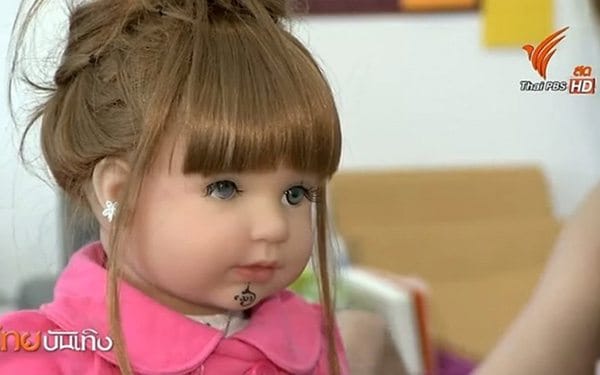The international media has been having a field day since the announcement by Thai Smile Air that they will now allow passengers to buy plane tickets for their magical haunted dolls, otherwise known as luuk thep.
The decision was made after several passengers refused to stash their precious dolls inside their suitcases or in the overhead compartments because, they claimed, these are not just any old dolls.
Indeed, these dolls are actually alive, insist their human ‘parents’, because they have the souls of dead children residing in them.
These pseudo-parents, who have been shelling out plenty of baht for their dolls’ food, entertainment, clothes, and jewelry, were simply outraged that the airline was treating the dolls like inanimate objects.
Today, luuk thep dolls enjoy a variety of goods and services that have been made available just for them: buffet promotions, gold jewelry, cute clothes and accessories; even spa and facial treatments.
A quick crash course on the luuk thep phenomenon, which has grown into a frenzy recently:
Luuk thep are actually the modern version of kuman thong; an ancient practice where a dead fetus was roasted and covered in gold leaf – thus the name ‘kuman thong’, which means ‘golden child’ – in order to invite good fortune. Whoever possesses a kuman thong has a duty to properly care for and worship it in return for future favor.
However, since both a necromancer and a real, dead fetus are needed to make a kuman thong, a luuk thep (meaning ‘child angel’) is a more convenient and updated version of this ancient – and some might say morbid – practice to provide hope and confidence.
One simply has to buy a luuk thep doll (which, as far as this writer knows, contains NO human body parts), priced anywhere between ฿2,000 to ฿20,000, and instruct a monk to recite a magical incantation to invite a dead child’s soul in to inhabit the doll. Then the so-called parent will need to take care of and spoil the doll by providing clothes, food, time, love and attention. In return, the luuk thep will bring good fortune like money, love and happiness.
Generally speaking, Thais have always been a superstitious bunch, and this writer has seen many mystic trends come and go over more than two decades living in Thailand: ‘power’ stone bracelets, ‘lucky’ color nail polishes, misshapen plants and animals that supposedly reveal winning lottery numbers.
And, of course, let us not forget the various amulets that are supposed to guarantee the owner of everything under the sun; from attracting money and sexual partners to protecting against accidents and enemies.
Even the elite of Thai society are not immune to these superstitious beliefs.
Five years ago, when Bangkok was under threat of serious flooding, the Governor M.R. Sukhumbhand Paribatra prayed to the River Goddess Ka Kang for mercy so that she would spare the capital from the watery onslaught (to no avail).
And who can forget the time when one of the leaders of the yellow shirts’ People’s Alliance of Democracy (PAD), Sondhi Limthongkul, used the bloody sanitary pads of the group’s female members to repel the evil ‘black magic’ supposedly practiced by the group’s enemies (Thai superstition claims that menstrual blood possesses a devastating power).
Many outsiders would scratch their heads and bemoan these beliefs as silly and maybe even embarrassing. However, a closer look at Thai culture gives us clues as to the underlying reasons why Thais just cannot let go of their superstitions.
First and foremost, these beliefs act like shortcuts. Thais value convenience and ease, so if there is a shortcut available, it is always preferable.
Want to avoid road accidents? Forcing the whole population to learn how to drive properly takes great time and money, so buying amulets that supposedly protect the driver is an easy shortcut.
Want to get A+ for that important test? Studying and reviewing takes time and effort. It is less painful to simply pray to the Hindu Lord Ganesh for that grade instead.
Indeed, the whole idea of thambun (making merit) at the temple by releasing animals or making donations is seen as a shortcut to many of life’s greatest desires – money, love, health and happiness – without having to endure the long, arduous processes that are normally required to achieve those things.
Thais are also highly influenced by celebrities.
Lacking substantial role models, many Thais look up to celebrities and follow whatever trend is started by their favorite stars. This is particularly true of the luuk thep craze – it took off after several celebrities claimed that their luuk thep dolls were behind their success and wealth.
Perhaps the most significant reason for the recent rise of superstition is the overall malaise the whole country is feeling.
The economy is spluttering, there is an ongoing drought, the military government is seemingly in no hurry to hold elections and return power to the people, memories of last year’s bombings still loom in the background, and Thai society has remained fragmented.
2015 has been a tough year, and there is no reason to believe that 2016 will be better – there is a dengue outbreak, the rainy season is predicted to come late (worsening the ongoing drought), foreign investment is down, and the depressing list goes on.
Even the perceived bright spot of the formation of the AEC (ASEAN Economic Community) is blighted by reports that Thais will lose out on regional jobs as their command of the English language is low in comparison to their neighbors – they were ranked just 14th out of 16 countries.
This pessimistic mood has enveloped the country, and many people are feeling overwhelmed.
When no easy, logical solutions are available, it makes sense that the populace turn to their tried and trusted superstitions – luuk thep being one of them – that offer hope in small, simple doses.
Featured image is a still from a Thai TBS broadcast and is via Business Insider


